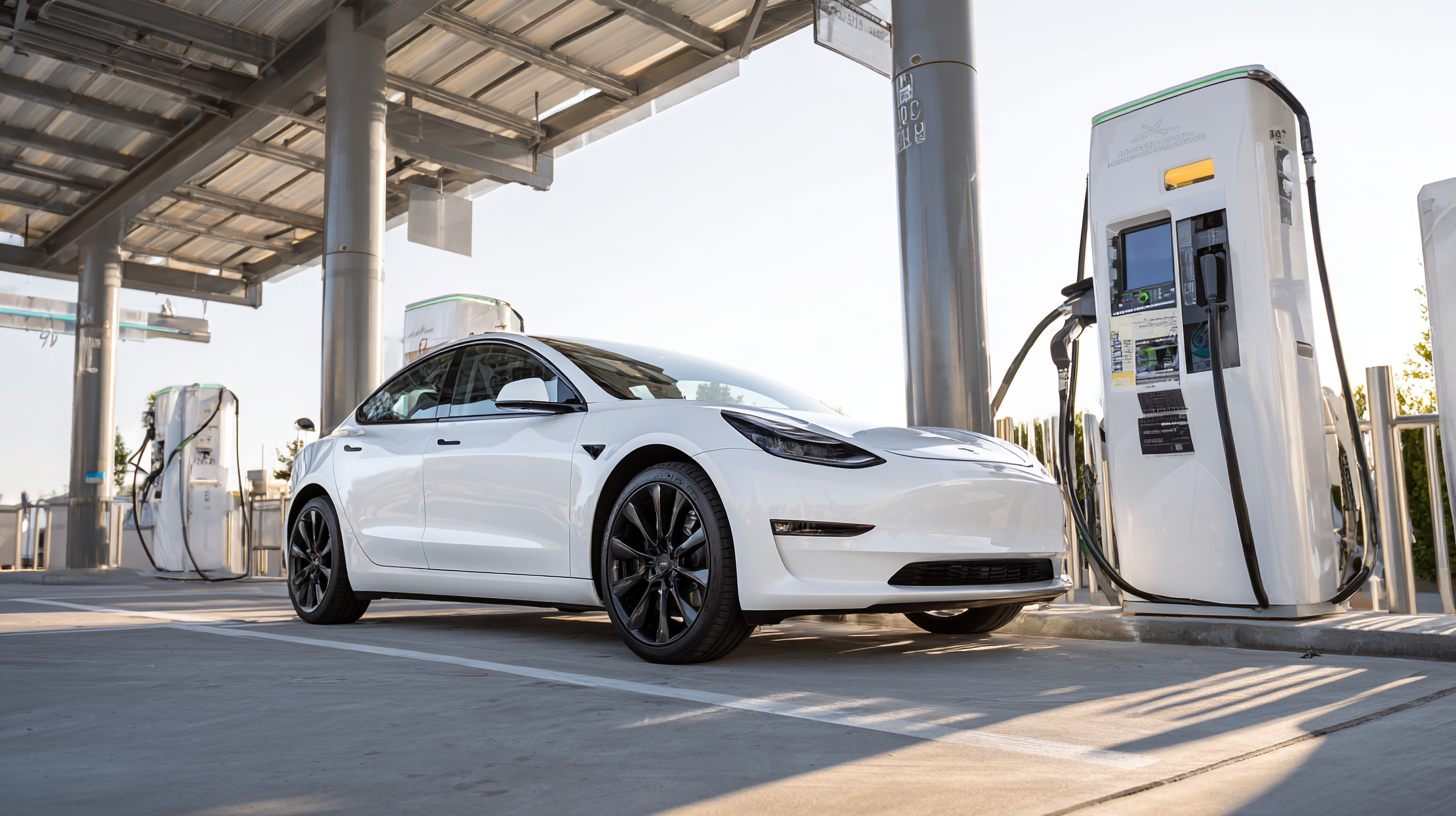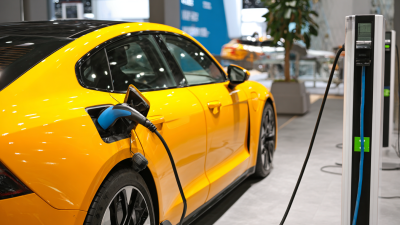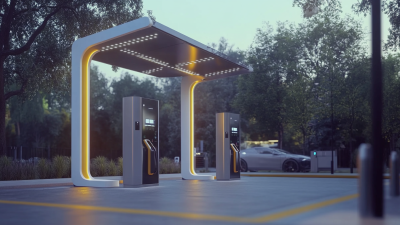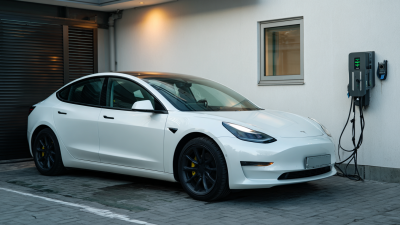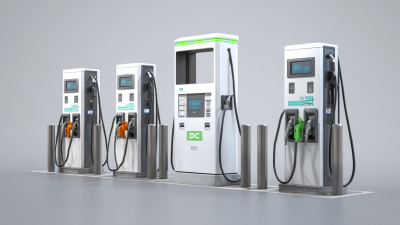The Electric Car Charger Business is poised for significant growth as the demand for electric vehicles (EVs) continues to surge globally. According to a report by Research and Markets, the global electric vehicle charging infrastructure market is expected to reach $70 billion by 2027, growing at a compound annual growth rate (CAGR) of 33.9% from 2020. This remarkable expansion presents a wealth of innovation opportunities for businesses within the sector.

As governments implement stricter emissions regulations and incentivize EV adoption, the necessity for accessible and efficient charging solutions becomes increasingly vital. Moreover, advancements in smart charging technologies, including AI-driven management systems and integration with renewable energy sources, are set to transform the landscape of the Electric Car Charger Business. In this dynamic environment, companies that embrace digital transformation and sustainable practices will not only enhance their competitive edge but also contribute to the broader goal of reducing carbon footprints and promoting greener transportation methods.
As the electric vehicle (EV) market continues to expand, innovative charging solutions are poised to revolutionize the industry. One of the most exciting developments is the implementation of ultra-fast charging stations, which can significantly reduce charging time from hours to mere minutes. This breakthrough not only enhances user convenience but also encourages more consumers to make the transition to electric vehicles. Furthermore, integrating smart technologies into charging infrastructure allows for real-time monitoring and dynamic pricing, catering to the evolving demands of EV owners while optimizing energy consumption.
Additionally, wireless charging technology is gaining traction, offering a seamless experience for drivers. By eliminating the need for physical cables, this advancement enhances the convenience of charging, particularly in urban environments where traditional charging stations may be limited. Moreover, the incorporation of renewable energy sources in charging stations fosters sustainability, aligning perfectly with the goals of the electric vehicle market. Together, these innovative charging solutions create ample opportunities for growth, ensuring a robust infrastructure that can support the increasing adoption of electric vehicles in the coming years.
| Charging Solution | Charging Speed (kW) | Type of Charger | Location | Market Potential ($ Billion) |
|---|---|---|---|---|
| Ultra-Fast DC Charger | 350 | DC Fast Charge | Highway Rest Areas | 10 |
| Level 2 Home Charger | 7.2 | AC Charger | Residential Areas | 5 |
| Robotic Charging Station | 250 | Automated DC Charger | Urban Environments | 3 |
| Solar-Powered Charger | 5 | AC Charger | Parks and Open Areas | 2 |
| Wireless Charging Station | 10 | Inductive Charger | Commercial Parking Lots | 8 |
The integration of smart technology in the electric car charger industry is transforming user experiences and operational efficiency. According to the global market research firm MarketsandMarkets, the electric vehicle charging infrastructure market is expected to grow at a CAGR of 34.6% from 2020 to 2025, reaching a value of $27.7 billion by 2025. This dramatic growth indicates not only increased adoption of electric vehicles but also an escalating demand for innovative charging solutions.
Smart technology, including IoT connectivity and user-friendly mobile applications, is at the forefront of enhancing the consumer experience. These technologies allow users to track charging status in real-time, locate the nearest available charging stations, and even schedule charging sessions during off-peak hours to optimize energy costs. Moreover, a report by Deloitte suggests that the integration of artificial intelligence (AI) can lead to significant improvements in charging station efficiency by predicting peak usage times and managing load distribution.
Such innovations not only enhance user convenience but also contribute to the sustainable growth of the electric vehicle ecosystem, ultimately leading to lower operational costs and a reduced environmental footprint. As the market continues to expand, the potential for smart technology in electric car chargers presents substantial opportunities for businesses looking to differentiate themselves in a competitive landscape.
Sustainable energy sources for charging stations present a pivotal opportunity for the electric car charger business, facilitating eco-friendly growth while addressing the rising demand for clean energy solutions. By integrating solar panels and wind turbines into charging infrastructure, businesses can harness renewable resources to power their stations. This approach not only reduces operational costs but also enhances the appeal of electric vehicles (EVs) to environmentally conscious consumers.
Moreover, the development of energy storage systems, such as batteries, allows charging stations to store excess energy generated during peak sunlight or windy periods. This stored energy can be utilized during high-demand times, ensuring a consistent and reliable charging experience. As more governments and organizations commit to sustainability goals, the adoption of green technologies in charging networks will become increasingly crucial. Investing in sustainable energy sources not only aligns with global environmental initiatives but also positions businesses at the forefront of a rapidly evolving market, ripe with opportunities for innovation and growth.

The rapid adoption of electric vehicles (EVs) is reshaping the automotive landscape, and with it comes an increasing demand for robust charging infrastructure. As more consumers transition to EVs, the expansion of charging networks is vital for ensuring convenience and accessibility. This presents a unique opportunity for innovative businesses to develop and implement advanced charging solutions that meet the needs of a growing market.
One effective strategy for enhancing charging network infrastructure is the deployment of fast-charging stations in high-traffic areas. These stations not only reduce the wait time for drivers but also attract more customers to nearby businesses, creating a win-win situation. Companies can explore partnerships with retailers and local governments to secure strategic locations that maximize visibility and usage.
Tips for Businesses:
The electric vehicle (EV) charger ecosystem presents a plethora of collaboration opportunities that are essential for driving innovation and growth in this burgeoning industry. Partnerships among automotive manufacturers, charging station providers, and technology firms can enhance the infrastructure needed to support the increasing adoption of electric vehicles. For example, aligning with renewable energy companies can lead to the development of green charging solutions, thereby addressing environmental concerns while simultaneously appealing to eco-conscious consumers.
Moreover, collaborations between tech startups and established corporations can accelerate the integration of smart charging technologies, such as mobile apps that allow users to monitor and control their charging sessions remotely. These synergies not only improve user experience but also streamline operations, making charging stations more efficient and accessible. Additionally, local governments can play a vital role in these partnerships by providing incentives for businesses to invest in charging infrastructure, thereby creating a supportive environment for the electric charger market. This interconnected approach enables all stakeholders to benefit from the rapid growth of electric mobility.
